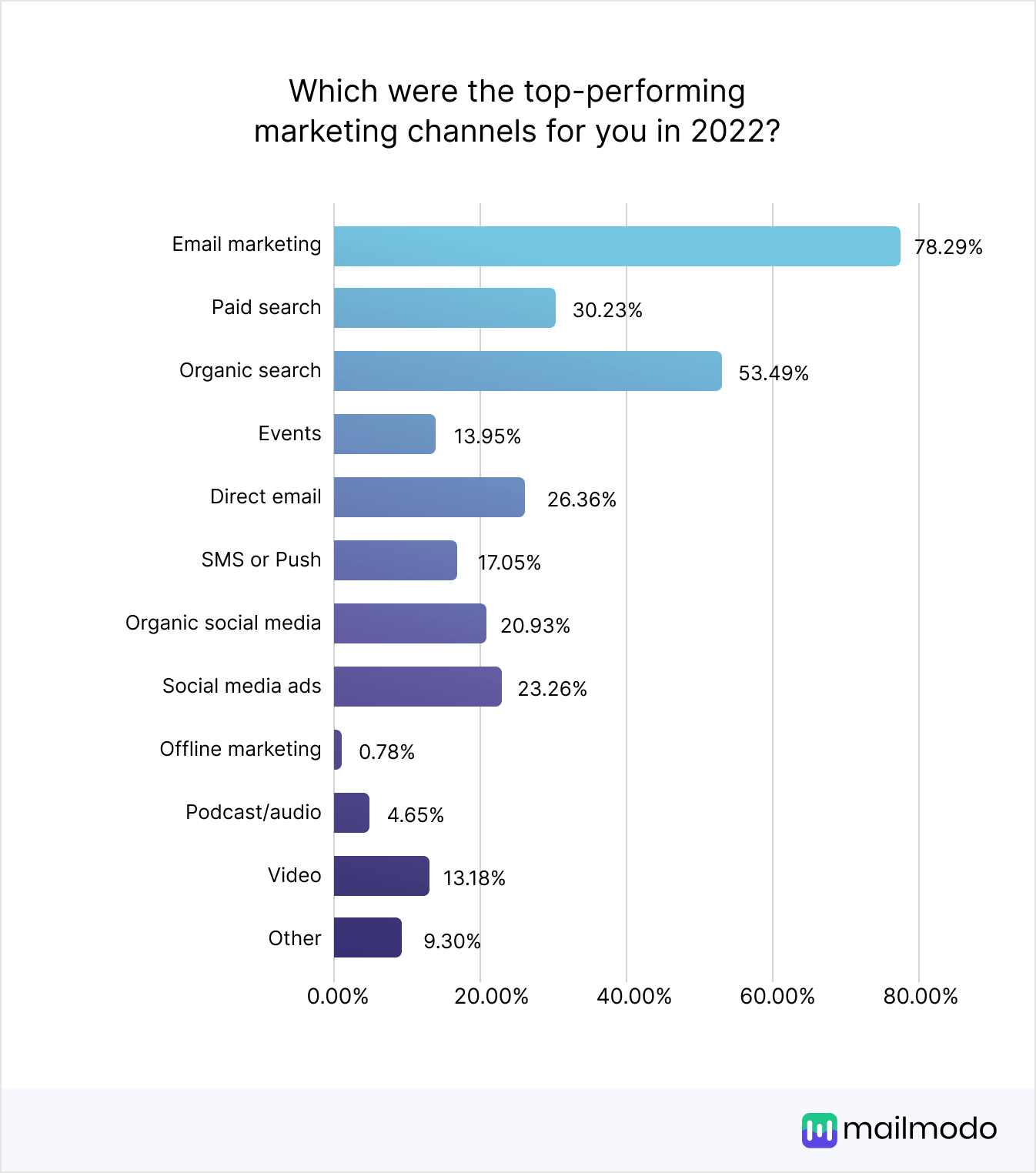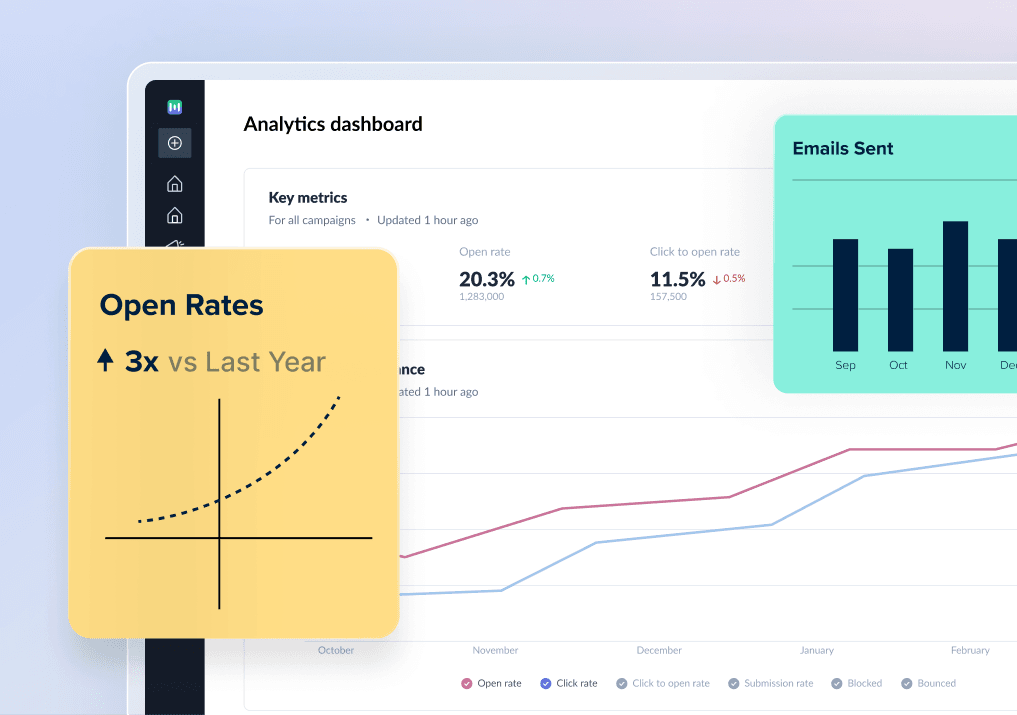About Email Marketing Pricing Calculator
This calculator has been created by Mailmodo based on existing available data on the respective websites of the products. If you have any updates or corrections to share with respect to this calculator, please mail us at enquiries@mailmodo.com
What is an email marketing pricing calculator?
This pricing calculator is designed to help you compare Mailmodo’s pricing with other Email Service Providers and make a better and more informed decision while selecting an ESP for your business.
The calculator allows you to select the company, desired features, number of contacts managed and number of emails sent to provide you with the ESP best suited for the needs of your business.
Who built this email cost calculator and why?
The team at Mailmodo has built this cost calculator to enable you to make a better-informed decision and save time in that process.
This calculator helps you compare all the popular email service providers against Mailmodo and helps you select specific desired features to find the best-suited ESP for your business needs.
How to use this email marketing pricing/cost calculator?
Select an email marketing solution from the competitor companies to compare with Mailmodo from the drop-down menu.
Select the desired features that you are looking for in your ESP.
Select the number of contacts you have and the number of emails you send on a monthly basis.
The calculator will show you if the selected ESP has a plan cut out for your requirements.
If yes, the calculator will show you the plan and the price of the plan which fits the requirements
How to find the best email service provider for my business?
Formulating a clear plan is essential for the success of any marketing campaign. While choosing the email service provider for your business, you need to keep these points in mind:
Features: Prioritize which features are a must for your business needs and look for platforms that provide those features. For example, if customer service is of prime importance to you, an ESP which doesn’t have human customer service, might not be the best fit.
Contact list size: Pricing and plans of the email service providers depend on the size of your contact list.
Number of emails: Number of emails also plays a role in deciding the pricing of the email service providers.
You can use Mailmodo’s pricing calculator to set these variables based on your needs and the calculator will tell you the best-suited plan, pricing, and platform.
What are the features that can be compared to this calculator?
No-code email builder: A tool that allows you to create email campaigns without the need for coding.
Human customer support: A team of people who are available to answer questions and provide assistance to customers.
Email automation: A process where email campaigns are automatically triggered based on certain actions or events.
AMP email builder: A tool that enables you to create dynamic and interactive emails using Accelerated Mobile Pages (AMP) technology.
AMP email sending: The process of delivering emails created using AMP technology to recipients' inboxes.
Email analytics: Data and insights about email campaigns, such as open rates, click-through rates, and conversions, that help you measure their effectiveness and optimize future campaigns.
Transactional emails: Automated messages sent to customers after they perform a specific action on your website or application, such as making a purchase.
Contact management: The process of organizing and managing your email contacts, including adding, editing, and segmenting them based on various criteria.
Custom event triggers: A feature that allows you to automate email campaigns based on specific actions or events, such as a customer adding a product to their cart.
REST API: A programming interface that allows you to interact with a server or database to retrieve or modify data, often used to integrate email marketing with other software or platforms.
Drag and drop editor: A visual interface that enables you to create email campaigns by dragging and dropping various elements onto a template.
Landing page builder: A tool that allows you to create custom web pages.
Static and dynamic segments: Two types of email contact segments, static segments consist of fixed groups of contacts, while dynamic segments are created based on certain criteria or actions.
A/B test subject line: A process of testing two different subject lines to determine which one performs better in terms of open rates.
A/B test templates: A process of testing two different email templates to determine which one performs better regarding click-through rates or conversions.
Dynamic email content: A feature that enables you to personalize email content based on a recipient's behavior or preferences.
Omnichannel support: The ability to engage with customers across multiple channels, such as email, social media, and SMS.
CRM: A customer relationship management tool that enables you to manage interactions with customers and leads across multiple channels.
Website forms: Online forms that allow visitors to submit their contact information or other details, which can then be used to create email campaigns or segment your contact list.
Who are the major players that I can compare using this calculator?
You can compare Mailmodo’s pricing with all the major competitors in the market:
Mailchimp: An all-in-one email marketing platform for small businesses.
Elastic Email: An email delivery platform for marketers, with features such as email tracking, automation, and API integration.
Email Octopus: An email marketing platform that integrates with third-party tools and offers simple automation.
Omnisend: A marketing automation platform that combines email, SMS, push notifications, and other channels in one dashboard.
Mailjet: A cloud-based email marketing service with automation, segmentation, and personalization features.
Mailgun: An email API and SMTP service designed for developers, with features such as email validation and deliverability monitoring.
Constant Contact: An email marketing platform for small businesses with features such as automation, list management, and social media integration.
Campaign Monitor: An email marketing platform that offers advanced analytics, automation, and personalized content.
Stripo: An email template builder with a drag-and-drop editor and built-in testing tools for ensuring email deliverability.
Mailerlite: An email marketing solution with a drag-and-drop editor and automation features.
Aweber: An email marketing platform that offers automation, segmentation, and analytics features for small businesses and entrepreneurs.
Covertkit: An email signature management platform that allows businesses to create professional email signatures with custom branding.
Keap: A CRM and marketing automation tool that combines email marketing, sales, and customer management.
Moosend: An all-in-one marketing automation platform that offers email marketing, landing pages, and AI-powered personalization.
Sendpulse: A multi-channel marketing platform that includes email marketing, SMS, web push notifications, and chatbots.
Drip: An eCommerce-focused email marketing platform that offers personalized messaging, automation, and segmentation features.
GetResponse: An all-in-one marketing platform that includes email marketing, landing pages, automation, and webinar tools.
Zoho: A suite of business apps that includes an email marketing tool with automation, personalization, and analytics features.
Before choosing an email service provider there are a few things that one needs to consider to understand if email marketing is the right for them.
Here are a few things that you can consider before choosing an email service provider.
How much does email marketing cost?
The cost of email marketing depends upon your number of contacts and number of emails sent. The prices increase with the size of your email list. You can use this calculator to determine which plan from which provider suits best for your business. These prices are for when you are managing email marketing in-house.
If you decide to outsource email marketing to an agency, their pricing would depend on the services they provide. Some of the services that email marketing agencies provide include:
Content creation services
Analytics
Technical services
However, for a small business, hiring an agency may not be the most cost-effective way. A lot of email marketing platforms have tailor-made plans for startups and small businesses.
Is email marketing worth the investment?
Quick and easy to start: Sending email campaigns doesn't require a lot of time or technical knowledge. With ready-to-use email templates, you can send campaigns in minutes.
High ROI: Email marketing continues to be the top performing marketing channel with the highest ROI according to The State of Email 2023 report. Email marketing ROI stands at $42 for every $1 invested.

Easy to track metrics: Email marketing allows marketers to keep track of their marketing efforts by providing detailed information about campaign performance. This equips marketers to make better decisions.
Preferred by consumers: Consumers prefer email communication over other channels. According to a global study(source), 83% of people prefer marketing communication through emails.
Helps boost sales: Email marketing is a powerful tool to drive conversions and make the customers interested in your product. Here’s how Preplaced saw a 5X increase in their conversion rate with email marketing.
Create hyper personalized campaigns: With email marketing you can develop personalized emails for different audience segments.
Build relationships: Email marketing is one of the few ways you can connect with your customers on a personal level and foster relationships.
Direct traffic to website: You can increase the number of visitors to your websites by adding a compelling CTA in the email.
What are some of the use cases I can use email marketing for?
As one of the highest ROI-generating marketing channels, email marketing can serve a lot of use cases for a business. Some of which are:
Survey and data collection: Emails can be sent to gather customer feedback and collect data.
Acquisition: Emails can be a powerful tool to acquire new customers by providing engaging and valuable content.
Retention: Emails aimed at existing customers to keep them engaged and loyal to the company.
Awareness/Promotions: Emails are extremely helpful in increasing brand awareness and promoting the products/services to the customer.
Newsletters: Newsletters are sent at regular intervals sharing updates, news, and valuable content with the audience.
Transactional communication: Automated emails sent to customers after they perform a specific action on your website or application, such as making a purchase.

